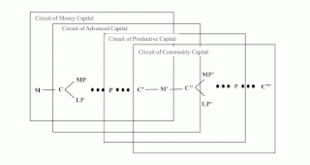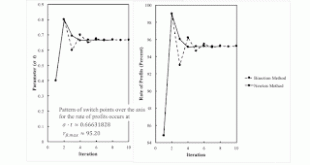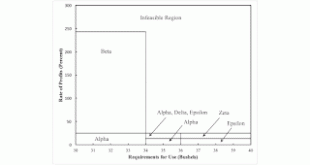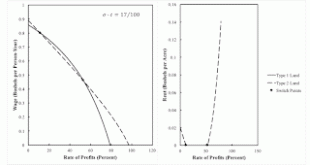Here is John Stuart Mill stating a principle that sounds noble, and then immediately making a strange caveat. "The object of this Essay is to assert one very simple principle, as entitled to govern absolutely the dealings of society with the individual in the way of compulsion and control, whether the means used be physical force in the form of legal penalties, or the moral coercion of public opinion. That principle is, that the sole end for which mankind are warranted, individually or...
Read More »Summary of Some Conclusions From My Research Program
This blog, over years, presents a welter of fluke cases. I created many of the numerical examples to illustrate the reswitching of techniques, capital reversing, or some such so-called 'perversity'. Fluke cases can be combined. For example, a fluke switch point at a rate of profits of zero can also be a fluke switch point at which three wage curves intersect. Or two switch points on the wage frontier can both be fluke switch points at which four wage curves, not necessarily the same,...
Read More »Mark Twain On The Wages Of Whiteness
In Mark Twain's novels, Huckleberry Finn is just a kid in what you might think is the most despised group in society. His mother ran away, and his father, who rarely is home to look after him, is the town drunk. Huck does not go to school, dresses in rags, and often sleeps outside in some barrel down by the waterfront. But Huck is quite conscious that some hard-working adults are looked down on worse than him by respectable people. 'That's all right. Now, where you going to sleep?' 'In...
Read More »The Four Circuits Of Capital
The Four Circuits of Capital Marx describes three circuits of capital in the opening chapters of Volume 2 of Capital. But when I draw a diagram, as above, a fourth circuit seems to be missing. So I have added the circuit of advanced capital. The circuit of advanced capital begins with commodities, consisting of means of production and labor power, in the hands of or under the direction of capitalists. They have purchased these commodities with monetary advances. The capitalists, at this...
Read More »How To Find Fluke Switch Points
Figure 1: Convergence to a Pattern of Switch Points over the Axis for the Rate of Profits1.0 Introduction This post illustrates how to find fluke switch points. As usual, I proceed by example, in this case, as taken from my paper in Structural Change and Economic Dynamics. 2.0 Technoplogy In this example of a capitalist economy, two commodities, iron and corn, are produced. One process is known for producing iron. In the iron industry, workers use inputs of iron and corn to produce an...
Read More »Ben Franklin, Proto Marxist
Ben Franklin was one the founding fathers of the United States. He participated in the constitutional convention. He was the first Postmaster General. He did experiments with electricity, when the Leyden jar was a new thing. There is a story about flying a kite in a thunderstorm. He also wrote about the wealth of nations: "Finally, there seem to be but three ways for a nation to acquire wealth. The first is by war, as the Romans did, in plundering their conquered neighbors. This is...
Read More »An Intensive Rent Example From Freni
Figure 1: A Pattern Diagram1.0 Introduction Aside, perhaps from the above visualization, nothing novel is presented in this post. It follows an example presented by Freni (1991). I know of this example from problems 7.7 and 7.29 in Kurz and Salvadori (1995). The oddities of this example can be seen in an earlier and more complicated example from D'Agata (1983). This is an example of intensive rent. When the requirements for use are large enough, capitalists will use more than one process...
Read More »Elsewhere
[embedded content]John Eatwell On The Bomb Sraffa Planted At The Foundations Of EconomicsJames Galbraith on Dismal Economics, reviewing books by Mason Gaffney and Fred Harrison, Stephen Marglin, Alessandro Roncaglia, and Robert Skidelsky. Jane Gleeson-White, in the Guardian, on accounting, unpaid care work, and the biosphere. A blog post pointing out Bob Murphy's confusions and mistakes on the implications of the Cambridge Capital Controversy for the Austrian school. Compare and...
Read More »What Is Socially Necessary Abstract Labor Time?
To me, this is an easy question. SNALT, for a capitalist economy, is: L = a0 (I - A)-1y The notation is from Luigi Pasinetti's Lectures on the Theory of Production. The idea can be empirically applied with data from national income and product accounts (NIPAs), using techniques explained in, for example, Ronald Miller and Peter Blair's Input-Output Analysis
Read More »Extensive Rent For A Reswitching Example
Figure 1: Wage Curves and Rent1.0 Introduction I might as well illustrate an example with extensive rent and reswitching. I find it incredible that the agents in these sorts of models understand the implications of, say, a variation of the distribution of income for their self-interests. Nevertheless, I try to note the consequences of variation in the distribution of income and perturbations of model parameters on prices of production. And I do not worry too much about disequilibria. 2.0...
Read More » Robert Vienneau: Thoughts Economics
Robert Vienneau: Thoughts Economics




